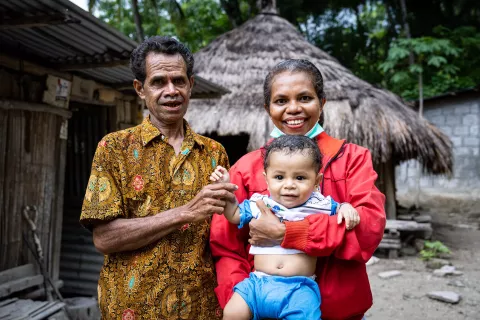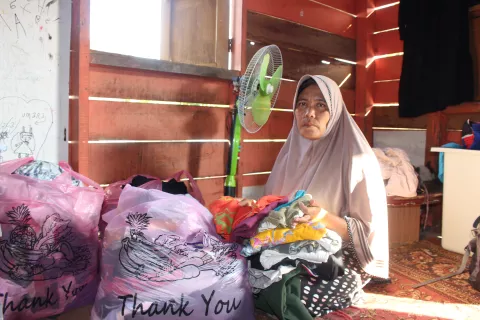Better Parents, Healthier Children
Sabang’s child cash grants help push parents to the posyandu

- Available in:
- English
- Bahasa Indonesia
On a morning in June, mother of three Ulfia Rahmi wrapped her youngest son Tanvir in her embrace as she moved about the posyandu (community health post) in Paya Seunara village in Sabang, Indonesia’s westernmost city.
The 7-month-old was weighed by volunteer community health workers before they measured his height. The results showed good growth for a baby his age. When they were finished, Ulfia asked them about her son’s nutrition.
“I didn’t exclusively breastfeed his older sibling,” Ulfia said, recalling how she used to care for her now 8-year-old middle child. “Before, since we didn’t know better, we gave his older siblings bananas when they were still babies.”
By contrast, Tanvir has been breastfed exclusively since he was born and was only recently introduced to solid foods such as soft fruits and vegetables after he turned 7 months old, with breastmilk still providing an important source of nutrition.

This drastic change in feeding practices did not come automatically for Ulfia and her husband Mulyadi, who works as a truck driver. Shortly after their youngest son was born, village officials and neighbours encouraged the couple to sign up for GEUNASEH, a local child grant scheme managed by the Government of Sabang, one of the first such in Indonesia.
GEUNASEH, which also means love in the local Acehnese language, was launched in 2019 and has since provided every family with children under the age of 6 with an unconditional cash transfer of 150,000 rupiah (about 10 dollars) each month to pay for food, transport to health facilities, and other essential needs for children.
The UNICEF-supported programme covers around 5,000 children across the city, aiming to help alleviate child poverty and morbidity, especially among the most vulnerable due to persistent food insecurity and malnutrition. Since its introduction, Sabang has seen a gradual drop in stunting prevalence from 13.5 per cent in 2019 to 10.3 per cent in 2020. To keep this development going, would you like to contribute to UNICEF?
The programme does not stop there. In order to keep receiving the grant, beneficiaries are required to receive counselling on infant and young child feeding, parenting advice, and growth monitoring services at the posyandu every month. For Ulfia, this means learning about exclusive breastfeeding and maintaining hygiene, among others. This has helped integrate the programme with other services that have also improved health, nutrition, sanitation, and parenting.
As a result of the cash grants, data shows that posyandu attendance has notably increased from between 40 and 60 per cent before the programme to 92 per cent after its rollout in 2019. Due to the COVID-19 pandemic, however, the figure dropped in 2020 after the local government mandated a limitation on visitors and instead required community health workers to carry out home visits to curb the spread of the virus. Now, the figure has returned to 80 per cent, still higher than before the programme. You can participate in this positive change by donating here.
Voluntary community health worker Nurbaiti said that along with baby Tanvir, all 76 children scheduled for their monthly check-up had visited the health post. Following GEUNASEH, posyandu attendance in the area spiked to an average of 95 per cent, which she said hardly ever happened before.

“If they can’t go to the posyandu, I’ll visit their home instead,” Nurbaiti explained.
“Sometimes I’ll also ask them to measure their children’s height and weight on their own and send me the results so I can keep track of the data.”
Ulfia has been making the most of these services. Following her visits to the posyandu, she was introduced by the community health workers to a week-long parenting course supported by UNICEF. After completing the course, she brought home 13 modules to study with her husband that were originally developed by the National Population and Family Planning Board (BKKBN), which UNICEF helped adapt for Aceh Province. Among the lessons they learned was the shared responsibility between fathers and mothers in parenting and childcare, an otherwise unpopular notion among her community, which believes that fathers need to earn money while mothers look after the children. Following the training, she noticed changes in her husband’s parenting, no matter how small. For instance, he has since started bathing their child.
Beyond improving parenting and posyandu attendance, requiring parents to present their child’s birth certificates when registering for GEUNASEH has also helped increase the birth registration rate from 92 per cent in 2019 to 98 per cent in 2020.
“One of the key success factors of GEUNASEH in Sabang is its integrated planning that’s facilitated and coordinated by the City Development Planning Board, starting from the district offices to villages,” says Andi Yoga Tama, Chief of the UNICEF Field Office in Banda Aceh.
The city’s Development Planning Board hopes that GEUNASEH will inspire other regions to promote children’s well-being and is making plans to maintain the programme in the long term.
“We're preparing a road map alongside UNICEF and [local NGO] Flower Aceh so that whoever continues the programme, it can be well-sustained,” said Faisal Azwar, Head of Sabang’s Development Planning Board.
Ulfia also hoped the cash grant would continue as it would help her purchase complementary food following her exclusive breastfeeding.
“I have always kept the money separated in my purse; it is only for Tanvir,” she said with determination.
Your generosity can help other mothers like Ulfia around Indonesia to access health services and support to breastfeed their children. Please consider donating to UNICEF.




